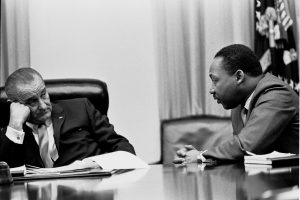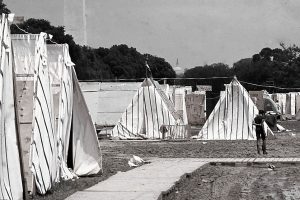Today, we commemorate the 51st anniversary of Dr. Martin Luther King, Jr.’s death: his assassination by James Earl Ray in Memphis, Tennessee, where King was preparing to march on behalf of sanitation workers on strike. In marking this tragic anniversary, we also celebrate the U.S. Civil Rights Movement King did so much to advance. Indeed, most 21st-century Americans see King as a national hero; we regard his writings, speeches, and sermons as key documents of the expanding American experiment, and we honor his memory through monuments, parks, schools, a holiday, and the names of our boulevards.
As much as King has become an American champion and even a legend, we should also—and especially on this day—recall the international scope of his vision: how King’s notion of “the beloved community” grew to encompass all the people of the world.

King refined his philosophy of nonviolent resistance to racial segregation, racist brutality, and injustice over many years, but even in the beginning, he saw the international dimensions of the civil rights struggle. In July of 1956, he gave a speech to the Home Mission Societies of Christian Friends in Green Lake, Wisconsin, while in the midst of the Montgomery bus boycott; the state statute requiring racial segregation on intrastate buses had just been overturned in district court, but the boycott continued and the case would not be decided by the U. S. Supreme Court until November of that year. With his feet in Wisconsin and his heart in Alabama, King nevertheless brought his mind and the minds of his listeners to global horizons: “Now this determination on the part of the Negro to struggle and to struggle, until segregation and discrimination have passed away, springs from the same longing for human dignity that motivates oppressed peoples all over the world. This is not only a nation in transition, but this is a world in transition.” In a later version of the speech, King said that actions like “non-cooperation and boycotts are not ends within themselves… the end is redemption and reconciliation. The aftermath of non-violence is the creation of a beloved community.”
King drew on a variety of religious and philosophical sources as he developed the basic tenets of this philosophy. The non-aggression principle of ahimsa, as popularized by Mahatma Gandhi, is the best known of these sources, as outlined in King’s 1959 Sermon on Gandhi. He also benefited from the ideas of the Fellowship of Reconciliation, an international interfaith group founded in 1914 in an attempt to prevent World War I; the U.S. chapter was attended by Josiah Royce, a theologian and philosopher who first articulated the idea of the beloved community. (Royce received one of the first doctorate degrees granted by Johns Hopkins in 1878. We have some of his early writings in the University Archives.) Over the years, King’s description of the ideals and practices of nonviolent resistance grew more specific, as he and his brother and sister activists sought to implement it in their arduous and dangerous work.

In April 1957, when he gave his sermon on “The Birth of a New Nation,” King’s beloved community was explicitly global. In this speech, celebrating Ghana’s successful fight for independence from British colonialism, he connected that struggle to the Indian independence movement and the U.S. struggle against segregation—and he invoked again the goal of a beloved community that leaves no one out. King’s view of the beloved community also clearly embraces migrants to and from all nations. In a 1966 note to Cesar Chavez, leading farmworkers who were largely undocumented, King said, “Our separate struggles are really one—a struggle for freedom, for dignity and for humanity.” And in his 1963 “Letter from Birmingham Jail,” a response to local clergy who objected to “outsiders coming in,” he issued perhaps his most eloquent defense of the beloved community as a global phenomenon: “Injustice anywhere is a threat to justice everywhere. We are caught in an inescapable network of mutuality, tied in a single garment of destiny. Whatever affects one directly, affects all indirectly.” His murder interrupted the launch of the Poor People’s Campaign, a multi-pronged crusade against U.S. poverty through policies to provide jobs, unemployment insurance, a fair minimum wage, and improved opportunities for education that was organized by over fifty multiracial organizations. While its immediate goals were national, its premise was transnational—a recognition that poverty at home was linked to economic and political power dynamics that created wealth and poverty everywhere.
In his last Sunday sermon, preached at the National Cathedral in Washington, D.C., King described the “great revolution” of his time in terms that are extraordinarily relevant to the networked, global dimensions of our lives in 2018. What was taking place in 1968, as he saw it, was “in a sense… a triple revolution; that is, a technological revolution, with the impact of automation and cybernation; then there is a revolution of weaponry, with the emergence of atomic and nuclear weapon of warfare; then there is a human rights revolution, with the freedom explosion that is taking place all over the world.” He closed the sermon by reminding his listeners not to despair on the hard road to freedom, because “however dark it is, however deep the angry feelings are, and however violent the explosions,” what we are capable of making is “a beautiful symphony of brotherhood.”
